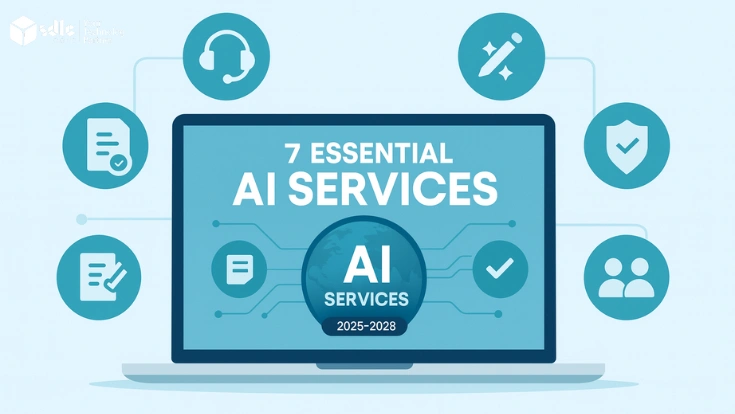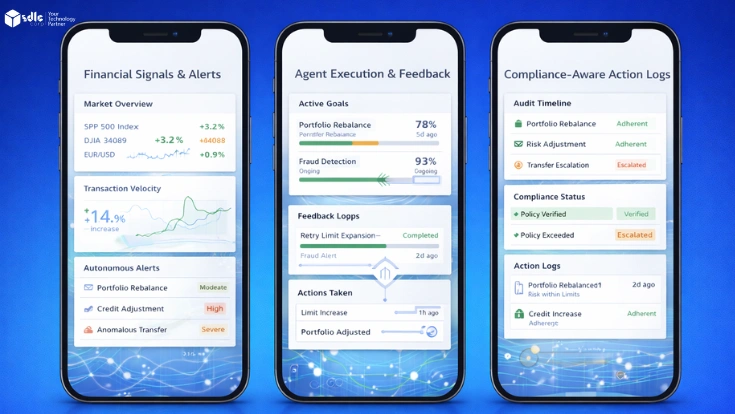Introduction
Generative AI for Real Estate streamlines sales, sharpens marketing, and improves decision-making by creating property content, market forecasts, and virtual staging from vast data. It helps professionals work faster, adapt to market shifts, and personalize client experiences.
Unlike traditional automation, it generates fresh insights that enable proactive strategies, build trust, and boost profitability making adoption a competitive must.
Market Analysis and Property Insights
Understanding market trends and property performance requires analysing large datasets. Generative AI can help consolidate market reports, generate comparative summaries, and support valuation analysis.
In these cases, a Generative AI consulting company may assist in evaluating model use cases, defining data boundaries, and ensuring outputs remain grounded in reliable information.
1.The Game-Changing Potential for Real Estate Growth
The economic impact of Generative AI for Real Estate is immense. Industry analysts predict that AI-driven innovations could unlock billions of dollars in added value across residential, commercial, and investment property segments.
Moreover, the real estate market is evolving faster than ever. Buyers expect instant responses, personalized recommendations, and immersive virtual experiences, while sellers demand maximum exposure and faster closings. Therefore, integrating Generative AI for Real Estate provides the scalability, accuracy, and adaptability needed to stay competitive.
In addition, this technology is not a passing trend but a foundation for sustainable business growth. Early adopters stand to gain significant long-term advantages in market share and profitability. Conversely, companies that delay may struggle to catch up as customer expectations continue to rise.

2. Reducing Costs and Boosting Efficiency with AI
Generative AI for Real Estate drives measurable cost reductions across multiple business operations.
For instance, marketing teams can instantly generate property descriptions, social media ads, and targeted email campaigns, cutting creative costs while maintaining consistent branding. Consequently, customer acquisition expenses can be reduced substantially when AI targets the right audience with precision messaging.
Moreover, AI-powered chatbots and virtual assistants can handle common inquiries, schedule viewings, and offer property suggestions. As a result, administrative overhead decreases, and agents can focus on high-value client relationships.
In addition, automation extends to document creation, such as contracts and lease agreements, reducing legal processing times and costs. Ultimately, these efficiencies enhance profitability without sacrificing quality or service.

3. Accelerating Time-to-Market for Property Sales
In real estate, timing often determines success. Generative AI for Real Estate enables faster listing creation, targeted marketing deployment, and quicker lead nurturing.
For example, when a property is listed, AI can instantly produce optimized descriptions, compelling headlines, and tailored advertisements for multiple platforms. Virtual staging once a costly, time intensive process can now be completed within hours, presenting buyers with fully furnished, visually appealing interiors.
Moreover, AI allows for rapid A/B testing of listing variations, providing real-time feedback to refine marketing strategies. Therefore, agencies can capture peak buyer interest at precisely the right moment, increasing both engagement and conversion rates.
4. Smarter Real Estate Investment Decisions

Generative AI for Real Estate empowers investors and developers with data-backed insights that minimize risk and maximize returns.
It can analyze market history, demographic trends, rental yields, and economic indicators to forecast property value growth. Moreover, predictive models can simulate “what-if” scenarios such as the impact of renovations, zoning changes, or market fluctuations helping investors make informed decisions.
In addition, AI can identify undervalued properties or emerging hotspots, giving early movers a competitive advantage. Consequently, investment strategies become more precise, strategic, and profitable.
5.Hyper-Personalized Marketing for Buyers and Renters
Personalization is no longer optional it’s expected. Generative AI for Real Estate enables hyper-personalized marketing by analyzing buyer preferences, search history, and behavior patterns to deliver tailored property recommendations.
For example, budget-conscious buyers might receive listings that maximize value, while luxury clients are shown high-end homes with premium features. Moreover, dynamic segmentation ensures that recommendations adjust in real time as client preferences evolve.
As a result, every interaction feels relevant, increasing the likelihood of engagement, loyalty, and conversion.
6.AI-Powered Content Creation at Scale

Creating consistent, high-quality marketing materials is a major challenge for real estate businesses. Generative AI for Real Estate solves this by producing SEO-optimized descriptions, blog content, ad copy, and investment summaries in seconds.
Moreover, AI can adapt content for different platforms from detailed MLS listings to engaging Instagram captions ensuring maximum impact across channels. As a result, businesses expand their reach without overloading marketing teams.
For more advanced operational efficiency, integrating tools like Odoo for Real Estate with AI solutions can streamline backend processes, automate repetitive tasks, and enhance customer communication.
7. Data-Driven Forecasting for Property Portfolios
Accurate forecasting is critical for portfolio management. Generative AI for Real Estate analyzes sales data, occupancy rates, seasonal demand, and economic indicators to deliver precise projections.
Moreover, AI supports scenario testing, such as evaluating how interest rate changes might affect investment returns. Consequently, property managers can make proactive decisions, reduce vacancies, and optimize portfolio performance.
By providing timely, data-backed insights, AI helps property owners and managers stay ahead of market changes.
8.Transforming Client Service into a Sales Engine

Generative AI for Real Estate enhances client service by turning every interaction into a sales opportunity.
AI-powered assistants can answer FAQs, arrange viewings, and suggest relevant properties instantly. Mortgage calculators, neighborhood comparisons, and ROI estimates can be generated in real time, guiding clients through informed decision-making.
As a result, client satisfaction and sales performance improve simultaneously.
9.Enhancing the Mobile Real Estate Experience
With most property searches starting online, mobile apps have become essential tools. Generative AI for Real Estate enhances these apps by delivering instant recommendations, investment advice, and scheduling capabilities.
Partnering with a real estate app development company ensures AI features are seamlessly integrated, creating an engaging and user-friendly mobile experience that retains clients and drives conversions.
10.Automating Back-Office Operations and Risk Management

Operational automation is another area where Generative AI for Real Estate shines. Tasks such as scheduling, reporting, and contract management can be streamlined significantly.
Moreover, AI strengthens fraud detection by identifying irregular transaction patterns, ensuring compliance with property laws, and reducing costly errors. Therefore, companies gain both efficiency and security advantages.
11.Empowering Real Estate Teams with Intelligent Tools
Generative AI for Real Estate acts as a productivity partner, enabling professionals to focus on strategic initiatives rather than repetitive work.
Agents can create customized property pitches, generate market reports, and receive pricing suggestions instantly. Consequently, productivity rises, and teams can dedicate more time to innovation and client engagement.
12.Your Roadmap to Successful AI Adoption

Before implementing Generative AI for Real Estate, companies should:
- Assess their data quality and infrastructure
- Identify initial high-impact use cases
- Integrate AI with CRM and MLS systems
- Provide training for smooth adoption
13.Scaling Responsibly with Governance and Ethics

Scaling AI effectively requires governance policies that guide ethical use, validate AI outputs, and protect client privacy.
Moreover, regular audits ensure bias reduction, and transparent communication builds client trust. Consequently, businesses can grow sustainably while maintaining integrity.
14.Case Study: AI-Driven Success in Real Estate
A regional real estate agency implemented Generative AI in three phases:
- Automated multilingual property descriptions, reducing marketing time by 35%
- Adopted predictive pricing tools, boosting sales conversions by 22%
- Added AI-powered virtual tours, attracting more out-of-town buyers
Within six months, the agency saw higher client satisfaction, increased lead quality, and a noticeable rise in profitability.
15. Ongoing Development and System Maintenance
Real estate markets change due to economic shifts, regulatory updates, and consumer behaviour. Generative AI systems must evolve accordingly. Some organisations choose to hire generative AI developers to maintain models, update integrations, and ensure systems remain aligned with operational and compliance needs.
16. Integration with Real Estate Management Systems
Generative AI tools often integrate with CRM platforms, property management systems, and analytics tools. Reliable integration requires stable infrastructure and consistent data flows.
Real estate firms may rely on AI development services to connect generative models with existing systems while maintaining accuracy and operational continuity.
Conclusion
Generative AI for Real Estate is no longer an emerging trend it’s a business essential. By adopting it, agencies can reduce costs, enhance personalization, and achieve faster, more profitable transactions.
The most successful firms will be those that act now, leveraging AI to secure a lasting competitive edge. Partnering with an expert Generative AI development company ensures access to the knowledge, tools, and strategies needed for effective implementation and long-term success.
FAQ'S
What is Generative AI in real estate?
Generative AI in real estate is an advanced technology that uses machine learning models to create new content, predictions, and innovative solutions tailored to the property sector. It can automatically generate detailed property listings, personalized marketing campaigns, market forecasts, and even high-quality virtual staging images. Moreover, it can optimize floor plans, produce AI-generated property visuals, and recommend pricing strategies based on historical data, seasonal trends, and buyer demand.
How can it improve sales?
Generative AI improves sales by automating marketing processes, personalizing buyer journeys, and predicting optimal pricing strategies. It can create persuasive, SEO-friendly property descriptions, generate targeted ad creatives for specific audiences, and provide real-time recommendations during client interactions. Additionally, it enables agents to respond faster with AI-driven chat assistants and ensures that property showcases both virtual and physical are tailored to a buyer’s preferences, increasing engagement and closing rates.
Can it help investors?
Yes—Generative AI offers significant advantages for real estate investors. Through predictive analytics, it can forecast future property values, rent potential, and neighborhood growth patterns. Investment simulations can model different market scenarios to assess potential risks and returns, helping investors make more informed decisions. Furthermore, AI can identify undervalued properties, suggest the best time to buy or sell, and streamline portfolio management for maximum profitability.
Is it costly to implement?
The initial cost of implementing Generative AI varies depending on the scope of the project and the chosen tools or platforms. While enterprise-level solutions may require a larger upfront investment, focused use cases such as AI-driven property marketing or automated valuation models can deliver a quick ROI. In many cases, the efficiency gains, cost reductions, and increased sales performance offset the investment within months.
How do I ensure ethical AI use?
Ensuring ethical use of Generative AI in real estate involves several best practices. First, maintain transparency with clients about when and how AI is being used. Second, regularly audit AI outputs to check for biases, errors, or misleading information. Third, safeguard client and property data through robust cybersecurity measures. Lastly, align AI usage with legal regulations, privacy standards, and industry guidelines to ensure that the technology enhances customer trust rather than undermines it.





